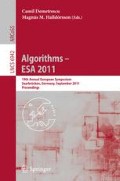Abstract
Quantified linear programs (QLPs) are linear programs with variables being either existentially or universally quantified. The integer variant (QIP) is PSPACE-complete, and the problem is similar to games like chess, where an existential and a universal player have to play a two-person-zero-sum game. At the same time, a QLP with n variables is a variant of a linear program living in \(\hbox{\rm I\kern - 0.15em R}^n\), and it has strong similarities with multi-stage stochastic linear programs with variable right-hand side. Our interest in QLPs stems from the fact that they are LP-relaxations of QIPs, which themselves are mighty modeling tools. In order to solve QLPs, we apply a nested decomposition algorithm. In a detailed computational study, we examine, how different structural properties like the number of universal variables, the number of universal variable blocks as well as their positions in the QLP influence the solution process.
Research partially supported by German Research Foundation (DFG) funded SFB 805.
Access this chapter
Tax calculation will be finalised at checkout
Purchases are for personal use only
Preview
Unable to display preview. Download preview PDF.
References
Achterberg, T., Koch, T., Martin, A.: Branching rules revisited. Operations Research Letters 33, 42–54 (2005)
Altenstedt, F.: Memory consumption versus computational time in nested benders decomposition for stochastic linear programming. Tech.Rep., Chalmers University, Goteborg (2003)
Bellmann, R.: Dynamic programming. Princeton University Press, Princeton (1957)
Benders, J.F.: Partitioning procedures for solving mixed-variables programming problems. Numerische Mathematik 4(1), 238–252 (1962)
Birge, J., Donohue, C., Holmes, D., Svintsitski, O.: A parallel implementation of the nested decomposition algorithm for multistage stochastic linear programs. Math. Program. 75, 327–352 (1996)
Birge, J., Louveaux, F.: A multicut algorithm for two-stage stochastic linear programs. European Journal of Operational Research 34(3), 384–392 (1988)
Birge, J., Louveaux, F.: Intro. to Stochastic Programming. Springer, Heidelberg (1997)
Dempster, M., Thompson, R.: Parallelization and aggregation ofnested benders decomposition. Annals of Operations Research 81, 163–188 (1998), doi:10.1023/A:1018996821817
Donninger, C., Kure, A., Lorenz, U.: Parallel brutus: The first distributed, fpga accelarated chess program. In: Proc. of 18th International Parallel & Distributed Processing Symposium (IPDPS). IEEE Computer Society, Santa Fe (2004)
Dyer, M., Stougie, L.: Computational complexity of stochastic programming problems. Math. Program. 106(3), 423–432 (2006)
Engell, S., Märkert, A., Sand, G., Schultz, R.: Aggregated scheduling of a multiproduct batch plant by two-stage stochastic integer programming. Optimiz. and Engineering 5 (2004)
Gassmann, H.: Mslip: A computer code for the multistage stochastic linear programming problem. Mathematical Programming 47(1-3), 407–423 (1990)
Ho, J., Sundarraj, R.P.: Distributed nested decomposition of staircase linear programs. ACM Trans. Math. Softw. 23, 148–173 (1997)
Kılınç Karzan, F., Nemhauser, G., Savelsbergh, M.: Information-based branching schemes for binary linear mixed integer problems. Mathematical Programming Computation (January 2010)
Kleywegt, A., Shapiro, A., Homem-De-Mello, T.: The sample average approximation method for stochastic discrete optimization. SIAM Jour. of Opt., 479–502 (2001)
König, F.G., Lübbecke, M., Möhring, R.H., Schäfer, G., Spenke, I.: Solutions to real-world instances of PSPACE-complete stacking. In: Arge, L., Hoffmann, M., Welzl, E. (eds.) ESA 2007. LNCS, vol. 4698, pp. 729–740. Springer, Heidelberg (2007)
Liebchen, C., Lübbecke, M., Möhring, R., Stiller, S.: The concept of recoverable robustness, linear programming recovery, and railway applications. Robust and online large-scale optimization, 1–27 (2009)
Lorenz, U., Martin, A., Wolf, J.: Polyhedral and algorithmic properties of quantified linear programs. In: de Berg, M., Meyer, U. (eds.) ESA 2010. LNCS, vol. 6346, pp. 512–523. Springer, Heidelberg (2010)
Megow, N., Vredeveld, T.: Approximation in preemptive stochastic online scheduling. In: Azar, Y., Erlebach, T. (eds.) ESA 2006. LNCS, vol. 4168, pp. 516–527. Springer, Heidelberg (2006)
Möhring, R., Schulz, A., Uetz, M.: Approximation in stochastic scheduling: The power of lp-based priority schedules. Journal of ACM 46(6), 924–942 (1999)
Ostrowski, J.P., Linderoth, J., Rossi, F., Smriglio, S.: Orbital branching. In: Fischetti, M., Williamson, D.P. (eds.) IPCO 2007. LNCS, vol. 4513, pp. 104–118. Springer, Heidelberg (2007)
Pochet, Y., Wolsey, L.: Production planning by mixed integer programming. Springer Series in Operations Research and Financial Engineering. Springer, New York (2006)
Poojari, C., Beasley, J.: Improving benders decomposition using a genetic algorithm. European Journal of Operational Research 199(1), 89–97 (2009)
Rockafellar, R.T., Wets, R.-B.: Scenarios and policy aggregation in optimization under uncertainty. Math. Oper. Res. 16, 119–147 (1991)
Ruszczyński, A.: Parallel decomposition of multistage stochastic programming problems. Math. Program. 58, 201–228 (1993)
Ruszczyński, A.: Decomposition methods in stochastic programming. Math. Program. 79, 333–353 (1997)
Schultz, R.: Stochastic programming with integer variables. Math. Progr. 97, 285–309 (2003)
Shmoys, D., Swamy, C.: Stochastic optimization is (almost) as easy as deterministic optimization. In: Proc. FOCS 2004, pp. 228–237 (2004)
Sirikum, J., Techanitisawad, A., Kachitvichyanukul, V.: A new efficient GA-benders’ decomposition method: For power generation expansion planning with emission controls. IEEE Transactions on Power Systems 22(3), 1092–1100 (2007)
Subramani, K.: Analyzing selected quantified integer programs. In: Basin, D., Rusinowitch, M. (eds.) IJCAR 2004. LNCS (LNAI), vol. 3097, pp. 342–356. Springer, Heidelberg (2004)
Subramani, K.: On a decision procedure for quantified linear programs. Annals of Mathematics and Artificial Intelligence 51(1), 55–77 (2007)
Van Slyke, R.M., Wets, R.: L-Shaped linear programs with applications to optimal control and stochastic programming. SIAM Journal on Applied Mathematics 17(4), 638–663 (1969)
Verweij, B., Ahmed, S., Kleywegt, A.J., Nemhauser, G., Shapiro, A.: The sample average approximation method applied to stochastic routing problems: A computational study. Comput. Optim. Appl. 24, 289–333 (2003)
Zhang, L., Hermanns, H., Eisenbrand, F., Jansen, D.: Flow faster: Efficient decision algorithms for probabilistic simulations. Logical Methods in Computer Science 4(4) (2008)
Author information
Authors and Affiliations
Editor information
Editors and Affiliations
Rights and permissions
Copyright information
© 2011 Springer-Verlag Berlin Heidelberg
About this paper
Cite this paper
Ederer, T., Lorenz, U., Martin, A., Wolf, J. (2011). Quantified Linear Programs: A Computational Study. In: Demetrescu, C., Halldórsson, M.M. (eds) Algorithms – ESA 2011. ESA 2011. Lecture Notes in Computer Science, vol 6942. Springer, Berlin, Heidelberg. https://doi.org/10.1007/978-3-642-23719-5_18
Download citation
DOI: https://doi.org/10.1007/978-3-642-23719-5_18
Publisher Name: Springer, Berlin, Heidelberg
Print ISBN: 978-3-642-23718-8
Online ISBN: 978-3-642-23719-5
eBook Packages: Computer ScienceComputer Science (R0)

